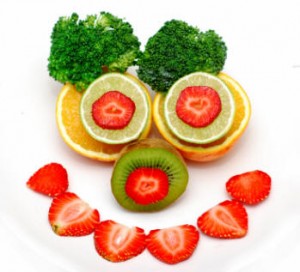Autistic children usually have problems when it comes to behavior, language development and social interaction. These problems may lead to other potential problems in children with ASD such as overeating and being overweight. Children with autism usually use food as their means of reducing stress and it can also become part of their obsessions.
 The food intake of autistic children is greatly influenced by their behavior; however, their nutrition also influences their behavior as well. According to studies, poor nutrition in autism may also lead to more severe unacceptable behavior in children. In fact, changing the diet of autistic children may help improve their behavior and the way they adapt to their environment.
The food intake of autistic children is greatly influenced by their behavior; however, their nutrition also influences their behavior as well. According to studies, poor nutrition in autism may also lead to more severe unacceptable behavior in children. In fact, changing the diet of autistic children may help improve their behavior and the way they adapt to their environment.
Autism is not curable so measures are geared at controlling their behavior and helping them adjust to their condition to promote optimum functioning. In line with this, proper diet may be one of the effective ways to support autistic children along with medications and behavior therapy.
Proper diet involves avoiding certain foods that may aggravate the behavioral problems of children as well as introducing key nutrients and supplements to support growth and development.
Foods to Avoid in Autism
- Food allergens
Autistic children usually have more incidences of food intolerance and food allergies. A hypoallergenic diet may help in reducing food allergies as well as improving behavior in children. In fact, a study in the Journal of Applied Nutrition recommends eliminating food allergens in order to improve unacceptable behavior in autistic children. Aside from food allergies, food intolerances may also worsen behavior of autistic children because of the build-up of unmetabolized chemicals in the blood. Because of this the following foods need to be limited, if not completely eliminated from the diet of an autistic child:
- Casein is a milk protein found in animal milk.
- Gluten is a protein found in wheat. It is mostly found in food products containing wheat, barley, oats and rye.
- Yeast may also be a source of food allergies. Eliminating foods containing it such as baked products and alcoholic beverages is essential.
- Wheat products such as wheat flour, bread and others also need to be eliminated.
- Processed Foods
Aside from those natural foods certain processed foods and beverages need to be eliminated from the diet. The various food additives they contain may result in a shorter attention span and hyperactivity in autistic children. Processed foods that should be eliminated are:
- Processed meat
- Canned goods
- Chocolate
- Fast food
- Junk food
- Soda
- Coffee
- Tea
Foods to give in cases of Autism
Providing foods essential for autistic children helps them grow and develop maximally. These may also help improve their behavior. The following are the essential nutrients that autistic children need:
- Vitamin B6
Vitamin B6 or pyridoxine is essential for autistic children. According to the American Journal of Psychiatry, vitamin B6 is especially important for children suffering from diarrhea and numbness of extremities. It is also essential to control hyperactivity and short attention span.
- Magnesium
Magnesium is another essential mineral for autism. Magnesium is important in reducing depression in autistic children especially those suffering from low self-esteem.
- Glucosamine
Glucosamine is given to autistic children suffering from recurrent diarrhea.
- Vitamin A and C
Vitamin A and C are important antioxidants that help reduce oxidative stress in cells, especially in the neurologic system; thereby improving behavioral symptoms.
Following this diet guide for autism, the behavioral symptoms of autistic children may improve; thereby also improving their adaptation and optimum level of functioning.
About The Author
Dr. Amarendra is very much enthusiastic to write on weight loss and weight loss products like TRX and Weight Watchers. Read the latest article on TRX and also on Weight Watchers voucher codes and discounts.






